
Nurses want foreign jobs, ministry expresses worry
The Ministry of Health (MoH) has expressed worry over the high desire of most nurses to serve abroad rather than serving the local tax payer whose money is used to train them.
It also expressed worry over the reluctance of most nurses to accept postings to rural areas and deprived communities in the country.
The Deputy Minister of Health, Mr Alexander Abban, expressed this when he addressed the second graduation of degree nurses at the School of Peri-Operative and Critical
Nursing and the School of Ophthalmic Nursing of the Korle Bu Teaching Hospital in Accra.
“It will surprise you to know the number of calls the ministry has received in relation to the President’s announcement that Ghana will soon be exporting nurses that the government is unable to engage due to vacancy and financial challenges,” Mr Abban said.
Describing the situation as unfortunate, he said the attitude of nurses in relation to where they were posted to could interfere with the delivery of the Universal Health Coverage (UHC) target in the country.
The two institutions, affiliated to the University of Cape Coast since 2016, graduated a total of 190 students.
The affiliation formed part of the MoH’s bid to upgrade post basic health training institutions to degree-awarding ones to enhance training and service delivery and make nursing more attractive.
The second undergraduate graduation was held on “Promoting Specialist Nursing Education in Ghana”.

UHC
Mr Abban said it was imperative that no Ghanaian was denied access to quality healthcare services regardless of their geographical location and or their financial status.
The deputy minister appealed to the nurses to have a change of mind and heart and accept posting to any part of the country and serve with humility, diligence, patience and with respect.
Speciality nursing
The Principal of the School of Peri-Operative and Critical Care, Dr Kwaku Asante-Krobea, said stakeholders had taken cognisance of the fact that advancing the practice of nursing could not be done without conscious efforts to train specialised nurses who would stand in the place of advanced practitioners.
Dr Asante-Krobea said state investment into the profession towards the achieving UHC was critical.
He appealed to the government to help expand existing infrastructure such as classrooms, accommodation, libraries, electronic libraries, among other facilities of the institution, to enable it to admit more students.
He also pleaded with the government to upgrade the academic staff through their enrolment into doctoral programmes to enhance their collaboration with affiliated institutions.
The Principal of the School of Ophthalmic Nursing, Mrs Stella Antwi Boasiako, said the development of new techniques in the diagnoses and treatment of eye conditions had increased the necessity to have more knowledgeable professionals in the eye care sector.
Scholarships
The representative of the Vice-Chancellor of the University of Cape Coast, Professor Kankam Boadu, said the UCC was proud to have mentored the two institutions in the training of speciality nurses to enhance healthcare delivery and the delivery of UHC.
He said it was unfortunate that although education was a human right, many qualified brilliant students were unable to gain higher education because of poverty.
“I appeal to higher institutions of education to institute scholarship schemes to help brilliant, needy students so that the country could harness its demographic dividends,” he said.
Writer’s email
